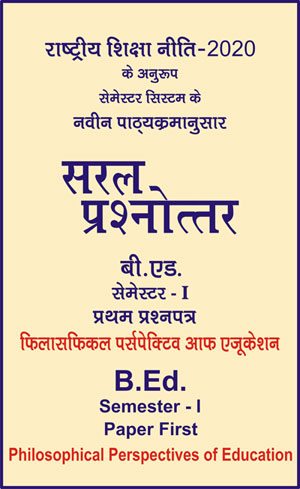|
बी एड - एम एड >> बी.एड. सेमेस्टर-1 प्रश्नपत्र-I - फिलासफिकल पर्सपेक्टिव आफ एजुकेशन बी.एड. सेमेस्टर-1 प्रश्नपत्र-I - फिलासफिकल पर्सपेक्टिव आफ एजुकेशनसरल प्रश्नोत्तर समूह
|
|
|||||||
बी.एड. सेमेस्टर-1 प्रश्नपत्र-I - फिलासफिकल पर्सपेक्टिव आफ एजुकेशन (अंग्रेजी भाषा में)
Question- Explain the impact of Idealism on education.
Or
The Most Important contribution of the idealistic philosophers in the field of education have been made by Plato, John Amos, J.J. Rousseau, J.H. Pestalozzi.
Answer -
Impact on Education
Ever since knowledge dawned in human mind man has been thinking about problems ontological, epistemological, eschatological and axiological. The questions of philosophy in the beginning of human knowledge were everywhere mixed with psychological problems. Thus, psychology in the beginning was concerned with the nature of the mind and the processes of consciousness. As men lived in small groups and the society was generally confined to a particular village, city or group of villages, the solutions offered were simple. There was hardly any distinction between social and political problems as the political institutions were developed as a means to social welfare. Therefore, most of the social philosophy was political philosophy. As the life was simple and social stratification and differentiation was not complex, the thinkers offered solutions working in more than one field of knowledge. Most of the thinkers were teachers and men of education who used to pass their life completely free from worldly affairs and the state and they were generally respected and followed. The job of instruction and education of younger generation was generally entrusted to these men of letters.
Aims and Ideals - Idealism has influenced every sphere of education. Thus, the idealists cherish the following aims and ideals of education.
1. Development of Personality: As it has been already pointed out, the most important aim of education, according to the idealist thinkers, both ancient and modern, Eastern and Western, is the development of personality. This has been called man-making by Vivekananda. Explaining this ideal of education Harman H. Horne says,
"The forces that make men and women I found to be heredity, environment and will. Education is not a fourth element force, but it does its works in co-operation with these three."
The idealists believe that man is God's finest ultimate creation. That is why the development of the human personality has been accepted as the aim of education, and stress has been laid on the teaching of humanitarian subjects such as literature, art, religion, ethics, etc. Through education, the cultural and social heritage of the community must be maintained and transmitted to the following generations.
2. Self-Realization: Some idealists believe that the aim of education is to guide the individual to self-realization for this also includes the development of the personality. Such development, in fact, is the development of those divine qualities which are inherent in human beings but which are dormant at his birth. The educator’s task is to manifest these qualities.
(ii) The object lesson method according to time and context should be used.
(iii) The power of will should be increased by self-suggestion, knowledge and practice.
(iv) Proper discipline leads to will-power.
(v) Practice is the only way to acquire will-power.
(vi) The educands should be acquainted of facts concerning nature and society.
(vii) Development of moral character by ethical instruction.
(viii) Freedom to make choice in most of the matters concerning the individual.
4. Synthesis of Man and Nature : Another aspect of the idealistic conception of education is the synthesis between nature’s aim at achieving an understanding of nature in human beings and educating the educand with the permanent laws which guide and control natural phenomena. These laws of nature are the cause of natural activity.
5. Cultural Development : Greatest significance is attached to the cultural environment created by religion, morality, art, literature, mathematics, science, etc. That is why the idealist tendency is to stress the teaching of humanities so that the cultural and social heritage is maintained intact and allowed to grow. Education is also concerned with enabling the individual to make his own contribution to cultural development of the community.
6. Explanation of Universal Values : Idealism places more emphasis upon more universal objects of education. Ross puts it thus, “The function of education is to help us in our exploration of the ultimate universal values so that the truth of the universe may become our truth and give power to our life. Education must aim at adapting not only to the physical environment but to every kind of environment.”
|
|||||

 i
i 










